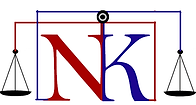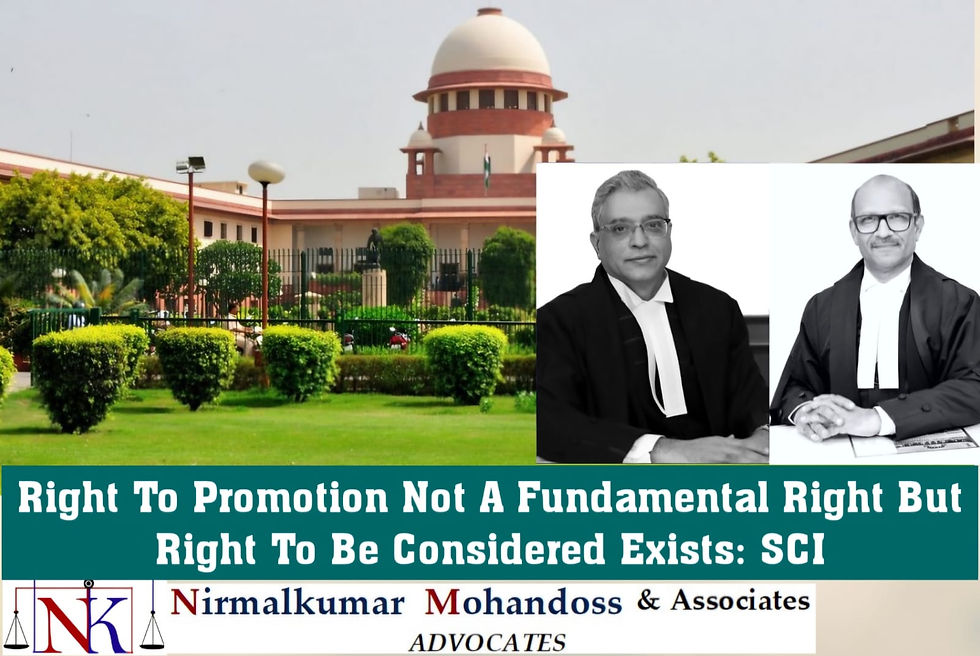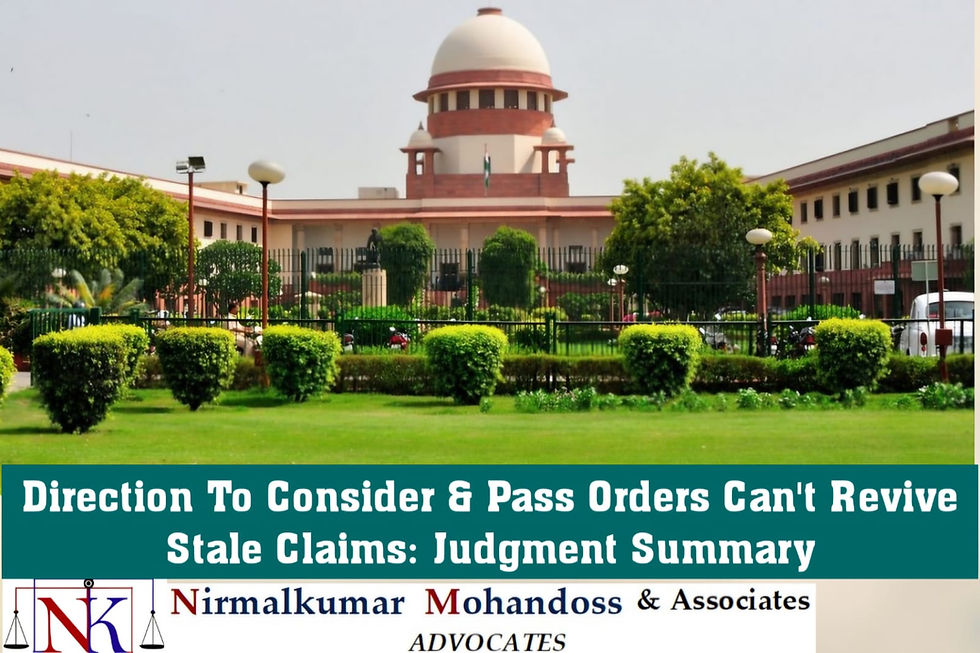Doctrine Of Delay & Latches Should Not Be Lightly Brushed Aside By Writ Court - SCI
- Nirmalkumar Mohandoss & Associates

- Aug 15, 2025
- 5 min read
In Chennai Metropolitan Water Supply & Sewerage Board Vs T.T. Murali Babu [Civil Appeal No. 1941 of 2014, reported in CDJ 2014 SC 106], the Supreme Court of India held that in exercise of extraordinary discretion under Article 226 of the Constitution of India, the writ court should not lightly brush aside the doctrine of delay and latches.

CASE SUMMARY
BRIEF FACTS:
- The respondent was appointed as a Surveyor in Chennai Metropolitan Water Supply and Sewerage Board (for short, “CMWSSB”) and subsequently promoted as Junior Engineer in 1989.
- From 28.8.1995 he remained continuously absent from duty without any intimation to the employer and did not respond to the repeated memoranda/reminders requiring him to explain his unauthorized absence from duty and to rejoin duty.
- On 1.4.1997 he reported to duty with the medical certificate for his absence from duty for the period commencing 28.8.1995 to 31.3.1997. As he had already remained unauthorisedly absent and did not respond to the memos by offering an explanation, a charge-sheet had already been issued on 11.9.1996 under the Chennai Metropolitan Water Supply and Sewerage Board Employees (Discipline and Appeal) Regulations, 1978 (for brevity “the Regulations”).
- The charge memo contained two charges, namely, that the respondent-herein had failed to submit an explanation to the first charge memo dated 11.10.1995 in spite of reminders and second, he deserted his post by remaining unauthorisedly absent from duty from 28.8.1995, and thereby committed misconduct under the relevant Regulations.
- Though the charge memo was duly acknowledged by the respondent on 19.11.1996, he chose not to submit his explanation till 6.1.1997, much after the charge-sheet was issued.
- An enquiry was conducted against the respondent and his explanation in the enquiry was that he could not attend to the duties and could not give explanation to the first charge memo because of ill health. The enquiry officer found charges were proved and, accordingly, submitted the enquiry report which was accepted by the disciplinary authority and after following the due procedure punishment of dismissal was passed on 16.4.1998.
- In the order of dismissal disciplinary authority observed that belated submission of medical certificate on 1.4.1997 irresistibly led to the conclusion that the respondent employee was unauthorisedly absent from 28.8.1995. A conclusion was also arrived at that the first charge, namely, that he had not responded to the letters and reminders, also stood proved. The disciplinary authority thought it apt to impose the punishment of dismissal from service and he did so.
- On an appeal being preferred by the respondent the Board rejected the appeal dated 30.6.1998. Being dissatisfied by the order of dismissal and the affirmation thereof in appeal, the respondent preferred W.P. No. 15272 of 1998. The learned Single Judge, by order dated 12.3.2003, directed re-consideration of the appeal solely on the ground that the Managing Director who was the disciplinary authority had taken part in the proceedings of the Board which decided the appeal.
- Accordingly, the matter was again placed before the Board and the appellate authority, considering the enquiry report, the evidence brought on record and after due discussion, affirmed the order of disciplinary authority and consequently dismissed the appeal on 1.7.2003.
- The grievance of re-affirmation of the order of dismissal was agitated by the respondent in W.P. No. 25673 of 2007 which was preferred on 7.7.2007. The appellant Board in the counter affidavit, defending the order of dismissal, stated that the only reason given by the employee was that he could not attend the duties as he was availing continuous treatment for tuberculosis and, further, he also met with an accident in September 1995 which was unacceptable. In addition, it was stated in the counter affidavit that bunch of medical certificates was produced by him on 1.4.1997 which mentioned that he was suffering from depressive psychosis and bronchitis and there was no mention about any accident and injury sustained by him in September 1995 and treatment availed by him.
- The learned Single Judge, by the impugned judgment, after narrating the facts, noted the statement of the learned counsel for the respondent that even if the employee had absented from duty, there was no past misconduct of desertion/absence and, therefore, the punishment of dismissal from service for the first time desertion/absenteeism is too harsh and disproportionate and deserved to be interfered with.
- The writ petition was allowed with a direction to reinstate petitioner with continuity of service but without back wage, within a period of four weeks from the date of receipt of a copy of this order.
- Aggrieved, the CMWSSB preferred Writ Appeal No. 2531 of 2012 and the Division Bench accepted the conclusion of the learned single Judge.
- This culminated into special leave to appeal before the Supreme Court.
DECISION OF THE COURT:
Appeal allowed setting aside the orders passed by the High Court in the writ petition and writ appeal.
REASONS PROVIDED/OBSERVATIONS MADE:
- Writ petition challenging the order dated 01.07.2003 passed by the Appellate board confirming the order of dismissal was preferred before the Madras High Court only on 07.07.2007 without any explanation for the delay in preferring the appeal.
- The doctrine of delay and laches should not be lightly brushed aside. A writ court is required to weigh the explanation offered and the acceptability of the same. The court should bear in mind that it is exercising an extraordinary and equitable jurisdiction. As a constitutional court it has a duty to protect the rights of the citizens but simultaneously it is to keep itself alive to the primary principle that when an aggrieved person, without adequate reason, approaches the court at his own leisure or pleasure, the Court would be under legal obligation to scrutinize whether the lis at a belated stage should be entertained or not.
- Delay comes in the way of equity. In certain circumstances delay and laches may not be fatal but, in most circumstances, inordinate delay would only invite disaster for the litigant who knocks at the doors of the Court. Delay reflects inactivity and inaction on the part of a litigant – a litigant who has forgotten the basic norms, namely, “procrastination is the greatest thief of time” and second, law does not permit one to sleep and rise like a phoenix.
- Delay does bring in hazard and causes injury to the lis. In the case at hand, though there has been four years’ delay in approaching the court, yet the writ court chose not to address the same. It is the duty of the court to scrutinize whether such enormous delay is to be ignored without any justification. That apart, in the present case, such belated approach gains more significance as the respondent-employee being absolutely careless to his duty and nurturing a lackadaisical attitude to the responsibility had remained unauthorisedly absent on the pretext of some kind of ill health.
- A court is not expected to give indulgence to such indolent persons who compete with ‘Kumbhakarna’ or for that matter ‘Rip Van Winkle’. Such delay does not deserve any indulgence and on the said ground alone the writ court should have thrown the petition overboard at the very threshold.
- The Courts below had not discussed the proof of charges but have restricted themselves to proportionality of the punishment imposed. The test of proportionality requires that the question whether a reasonable employer would have imposed such punishment in the like circumstances, is to be answered. Employees in any organization should adhere to discipline for not only achieving personal excellence but for collective good of an organization. In the case at hand, the respondent was a Junior Engineer. Regard being had to his official position, it was expected of him to maintain discipline, act with responsibility, perform his duty with sincerity and serve the institution with honesty. This kind of conduct cannot be countenanced as it creates a concavity in the work culture and ushers in indiscipline in an organization.
[This is a case summary and not an opinion piece.]




Comments